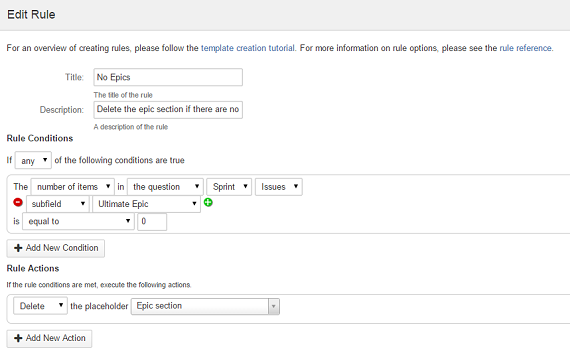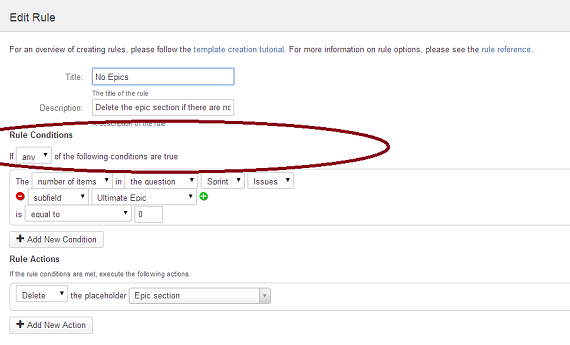Documentation
Getting started
Reports
Report templates
Administration
Conditionally executing rules
Intelligent Reports allows you to conditionally execute rules. These conditions are called rule conditions. Rule conditions are optional; if no conditions are specified for a rule, then that rule is always executed.
Rule conditions can be incredibly useful. For example, if you do not want to include a table if there are no rows, you can create a conditional rule which deletes the table if the table is empty.

The above screenshot shows a rule where the placeholder called "Epic section" is deleted in the event there are no epics in the sprint selected by the user as the answer to the question "Sprint". You can use similar conditions to delete document sections, or tables in the event data does not exist to fill them.
If you have more than one condition, you can select whether the rule should only be executed if all of the conditions are met, or if any individual condition is met.

You can use the drop down list to select whether you want the rule to be executed if "any" one condition is met or only if "all" conditions specified are met.
Intelligent reports provides the following types of rule conditions:
Data
A data rule condition compares the data in a JIRA field to a value you provide. Use the data select component to choose the data to compare. Then choose a comparison operator and enter a value to compare the data to. The operators and values available will depend on the type of data you choose.
Duration
Similarly to a data condition, a duration condition compares a value to JIRA data. However the value is compared to the difference between two JIRA dates that you can choose using two data select components. For example you could use a condition to detect if an issue took more than 30 days to resolve.
Number of items
A number of items condition allows you to make a condition based on the number of items in a list chosen using a data select component. Choose a list, a comparison operator and enter the value to compare it to. A common use of number of items conditions is to detect if a JQL query has zero results.
Calculations
A calculation allows you to specify a calculation which will be evaluated when the report is run. If the result of the calculation is true, the rule will be executed. If the result of the calculation is false the rule will not be executed. You can click here to learn more about calculations.